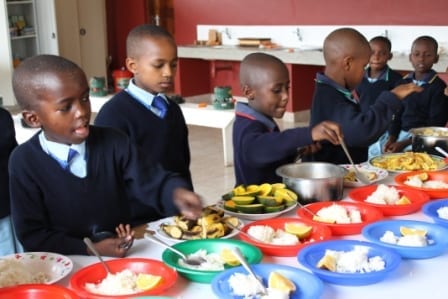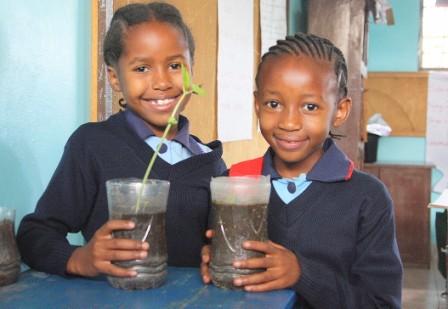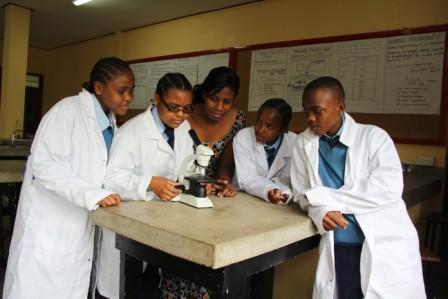Tanzania is a country with two parallels. It experiences growth in its gas reserves and the tourism sector but many of its people are marred by poverty. Added to that is a chronic shortage of skilled scientists and other professionals to advance the country forward.
The School of St Jude believes many of its young students have the potential to become the next generation of highly qualified scientists who will make breakthroughs in their fields. Tanzanian teachers nurture our students in the classroom so they learn a whole gamut of science subjects.
In earlier grades at St Jude’s, the students learn about nutritious food and its origins -- foods that will build, protect and energise them. They do activities like sorting through fruits, vegetables and grains to know their nutritional value.
These students come from impoverished backgrounds and do not always know which are good foods or understand what it means to have a balanced diet. Their confidence grows as they identify the different types of foods.
“It’s not a concept they know. At their home at the moment, they just eat what they get and not what is supposed to be eaten. So their meals are sometimes not complete or balanced,” says Ms. Ruth Kyata, Lower Primary Science Teacher at St Jude’s.
“However, they love learning about science at St Jude’s. They’re doing practical work. They’re going home to find out about different kinds of foods and then they come to school and ask you which kind of food does this belong to.”
At this early stage, they learn about healthy foods, body cleanliness and ways to look after themselves and keep their areas clean.
Our science teachers are supported by mentors and sometimes nuns in the classroom. The teacher mentors help staff to improve their English and show them new resources, while our nuns help students with activities.

As the students enter Upper Primary they’re building on their knowledge by doing more hands on science experiments, exploring body systems, different forms of energy and plant life. Thanks to St Jude’s generous supporters, the students have access to state-of-the-art science equipment and laboratories to conduct experiments.
“They learn about germination. They have to plant the seeds themselves and see how they’re developing, do measurements and watch it grow,” says Ms. Ernesta Njau, Upper Primary Science Teacher at St Jude’s.
“I love doing experiments because it’s fun to do them and learn. One time we had to use different solutions to make an egg float in water,” says Asindh, 6D student.
It is at this stage that the students are considering the science subjects that they will take on during secondary school at St Jude’s.

St Jude’s offers specialist academic streams including science and mathematics which are both highly popular with our secondary students at Smith Campus. With eight well-resourced science labs (four for A-level and four for O-LEVEL,) St Jude’s produces exceptionally high academic results in this area.
Fifty seven per cent of St Jude’s students are girls and a large number of them are studying science at St Jude’s Smith Campus. “The girls enjoy science and we’re encouraging them to pursue it as a career,” says Mr. Samwel Meing’atu, Secondary Science Teacher at St Jude’s. “We’re trying to eliminate that stigma which says science is only for men.”
The students can study a combination subjects like physics, chemistry and biology to help them reach their goals of going to university and becoming doctors, pharmacists, nurses or engineers. They do many more hands-on experiments and dissections of small mammals to better understand bodily systems.
“We need specially trained, good scientists because we have the emerging gas and nuclear sector and oil in Zanzibar,” says Mr. Meing’atu. “We’re preparing our students to have the confidence and skills to go to university and specialise in different careers. At the moment, they’re learning a little bit about medicine and studying the living organism. Through a variety of subjects, St Jude’s is stimulating the students’ minds.”
St Jude’s is preparing its students to be future leaders in their country, Africa and abroad. They have access to career counsellors and fairs to learn how they can break into their chosen industries.

We are proud that our students are constantly challenging themselves. Each year the school holds a science fair so the students can show their creative and technological innovations. Some secondary students have recently taken their modified generator project, which runs on three fuels, to Dar es Salaam, to enter in the Tanzanian Young Scientists Competition.
You can support St Jude’s by sponsoring one of our motivated students and teachers. By sponsoring a student you will help provide pens, pencils, books, school uniforms and nourishing hot lunches. You’d also be helping our teachers who are equipped with the necessary resources to use in the classroom.
You can find out more about our sponsorship packages here.
The sky’s the limit for our students who are already mapping out their careers in science, aviation, engineering, medicine, teaching, journalism and other fields.
St Jude’s has equipped them with the confidence and skills to believe in themselves and plan for their futures. We have well-stocked libraries, state-of-the-art science laboratories, ICT labs, art and music facilities.
Throughout the year, we also invite a range of guests to come and talk to our students about their jobs and how to enter into various industries. We have had visits from female civil and electrical engineers, some who have worked at The Nelson Mandela Institute.
The guests explained to the students about the many facets of the job and the education needed to get into the field. The students asked many questions and a few stayed after the talk to get further information about the different branches of engineering. The students found the female engineers very inspiring and saw them as role models for their future ambitions.
Our secondary students also had a guest talk from freelance journalist Adam Bemma, from Canada, about pursuing careers in media. He spoke about his education and how he worked as a radio journalist in his home country. Adam explained the role of the media and the need for good journalists in the development of a country like Tanzania.
St Jude’s has many talented creative writers who are continually looking for an outlet to publish their work. Some students planned to meet with Adam at the local Mambo Jambo radio station, so they could continue to learn about journalism.
Students also learnt about the exciting world of aviation when local pilot Captain Philemon Kisamo gave a talk to the class. He talked about the different types of aircrafts and the courses available.
St Jude’s exposes its students to critical and creative thinkers so they can have many choices when they are deciding their future careers.
Four St Jude's secondary students and two teachers were given the opportunity to climb Mount Kilimanjaro in January, with our great supporter, Global Immersion. Amani, one of our Form 4 students, reached the top. Steph, our volunteer Media Officer, caught up with Amani and transcribed his reflections on the awesome feat.
"As a young boy, I never thought it possible that I would climb Kilimanjaro so I when I got the amazing opportunity to do so, I was very excited about it. Climbing Kili was tough and I thought, at times, I wouldn't make it. I am used to hiking, long distance running and athletics but going up the mountain was a new challenge for me."
"On the first day, I felt no pain or tiredness and loved walking through a forest and observing the different types of plants. We walked for about five and a half hours and I dreamt about reaching the top. The second day was a bit tougher as I really felt the cold and had to learn to climatise to the altitude but I didn't give up."
"The last night was the most challenging but it was a wonderful feeling to reach Kili. At night, from high above, I could see the bright lights of Arusha and Moshi far below. Slowly and eventually I reached the summit. It was so amazing to be on top of it and seeing the sun rise and looking over at Mount Meru which looked very small. The sun was very near to me, when I was on the peak and I felt on top of the world."
"I am from the Chagga tribe, which is from the slopes of Mount Kilimanjaro, so I was climbing my mountain. That is what the porters would remind me of, when I felt discouraged, about how I was climbing "my mountain" and I should feel proud. I did. I felt like a 'Chagga Hero' because I had summited the mountain which is so important to me and my tribe. I felt like a great hero. It has made me feel like I can scale any mountain and I now hope and plan to climb one in Kenya someday."
"I am thankful and really appreciate St Jude's and Global Immersion for giving me the chance to climb Kili which I didn't think I'd ever get to do."